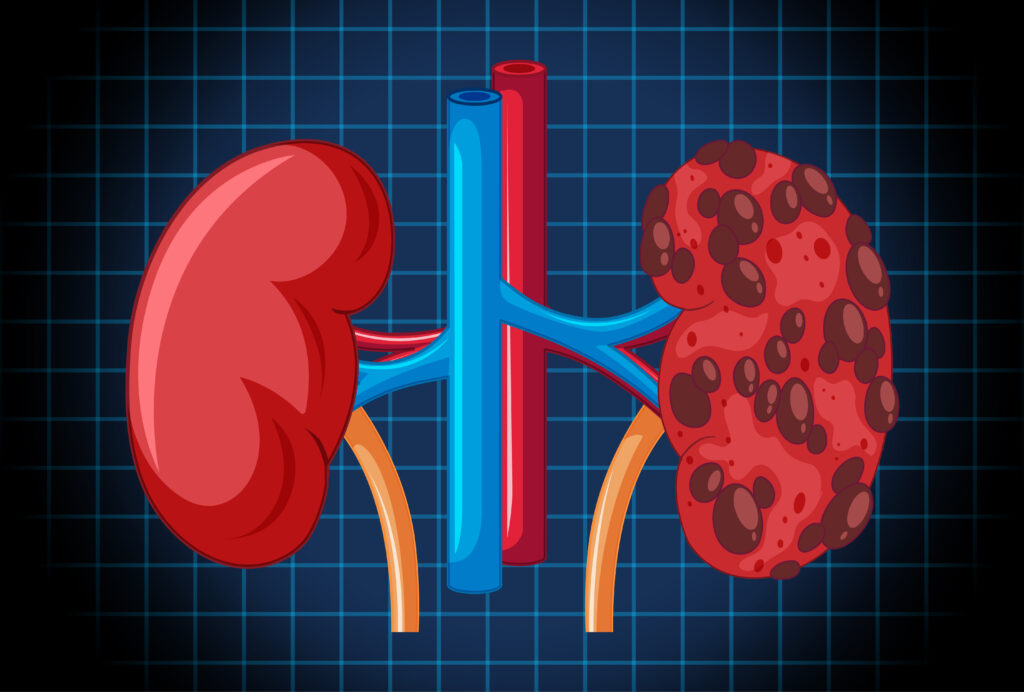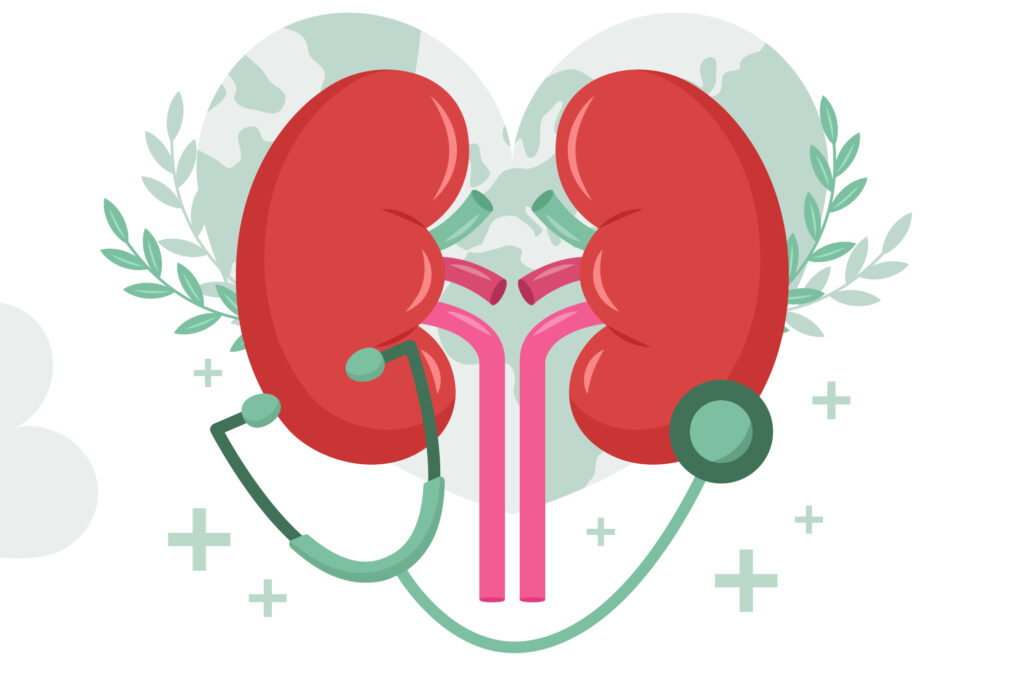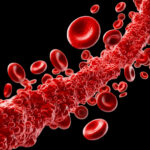We should be grateful to our organs as they work tirelessly every second to keep us alive and at
our best. Among many valuable organs, Kidney is a significant one after our heart and brain.
Kidneys often operate silently in the background, filtering waste and excess fluids from your
blood with incredible precision. Yet, when they begin to falter, the signs are subtle, and the
damage often irreversible.
Chronic Kidney Disease (CKD), a condition that affects every three
people out of five, creeps in gradually . making early recognition and intervention critical.
Awareness and measured action can bridge the gap between symptom onset and proper care.
Together, we will equip ourselves with a comprehensive understanding of CKD symptoms.
stages and treatment options to help you be better aware and do the needful either for yourself
or your loved ones.
Understanding Chronic Kidney Disease (CKD)
Chronic Kidney Disease (CKD) is a long-term condition where the kidneys gradually lose
function over months or years. Unlike acute kidney failure, which develops suddenly, CKD is
progressive and often asymptomatic in its early stages. It can stem from several causes —
commonly diabetes, hypertension, and autoimmune disorders and without timely intervention . It
may advance to End-stage Renal Disease (ESRD), requiring dialysis or transplantation of
kidney.
The Silent Onset: Early Signs of Kidney
The most dangerous aspect of CKD is it’s silent progression. Many individuals remain unaware
until the condition has significantly advanced. Recognising the early signs of CKD can be life-
saving.
Early Symptos May Include:
● persistent fatigue or tiredness
● swelling in ankles, feet or hands
● changes in urination ( more or less frequent, foamy urine)
● difficulty concentrating or mental fog
● muscle cramps at night
● dry, itchy skin
● puffy eyes, especially in the morning
These early signs of kidney disease are often mistaken for other conditions, making diagnosis
of kidney disease dependent on regular health checks and kidney function tests like GFR (
glomerular filteration rate) and creatinine levels.
Causes of Chronic Kidney Disease
understanding the causes of CKD can help prevent or delay it’s progression:
● Diabetes Mellitus (Type 1 and Type 2)
● Hypertension (High Blood Pressure)
● Glomerulonephritis – inflammation of the kidney’s filtering units
● Polycystic Kidney Disease – a hereditary disorder
● Prolonged Obstruction of the Urinary tract ( e.g., Kidney Stones, enlarged prostate)
● Recurrent Kidney infections
Lifestyle factors like a high-sodium diet, chronic dehydration, and excessive use of NSAIDs (
like ibuprofen) can also strain the kidneys over time.
Stages of Chronic Kidney Disease
CKD is classified into five stages, based on GFR (glomerular filtration rate). Understanding
these stages of chronic kidney disease helps patients and healthcare providers make informed
treatment decisions.
Stage 1: Damage in Kidney with normal or high GFR(90+)
● Symptoms: Often none
● Strategy : control risk factors, especially blood pressure and blood sugar
Stage 2: Slight Decrease in GFR (60–89)
● Subtle symptoms like fatigue and urination changes
● Time to monitor lifestyle closely
Stage 3: Average Downfall in GFR (30–59)
● CKD Stage 3 treatment may involve medications, dietary changes, and nephrologist
consultation
● Symptoms like swelling, fatigue , and back pain may become noticeable
Stage 4 : Severe downfall in GFR (15–29)
● Stage 4 kidney disease symptoms include severe fluid retention, nausea and possibly
anemia
● A critical phase requiring preparations for dialysis or transplant
Stage 5: Kidney failure (GFR<15)
● Also known as end-stage renal disease
● Requires renal replacement therapy like dialysis or kidney transplant
The renal failure stages must be managed proactively to preserve function as long as possible.
How to manage CKD and Slow Progression
Effective kidney health management revolves around the following pillars:
- Blood Pressure Diabetes Control
High blood pressure and uncontrolled blood sugar directly damage the kidneys. Medications
like ACE inhibitors and ARBs protect renal function. - Dietary Adjustments
A kidney-friendly diet is crucial to reduce:
● Sodium (salt)
● Potassium-rich foods (bananas, oranges)
● Phosphorous (diary, processed foods)
● Protein (especially in late stages)
Focus on hydration , leafy greens (in moderation), and whole foods. - Medical Management
Avoid over-the-counter painkillers like NSAIDs. Discuss all medications with a nephrologist to
prevent kidney-toxic interactions.
4.CKD Lifestyle Changes
● Quit smoking
● Engage in regular low-impact exercise
● Avoid alcohol or consume moderately
● Manage stress and sleep hygiene
These changes can slow down CKD progression, especially in early and moderate stages.
Treatment Options for CKD

CKD treatment options depend on the stage and cause but may include:
- Medication
To control blood pressure , diabetes, cholesterol, and anemia. Diuretics may be prescribed to
manage fluid retention. - Dialysis
Required when kidney function drops below 15%. Types include:
● Hemodialysis (machine-based blood filtration)
● Peritoneal dialysis (fluid exchange in the abdominal cavity) - Kidney Transplant
Recommended for eligible patients in ESRD. Transplants offer better long-term outcomes than
dialysis but require lifelong immunosuppression.
Diagnosis of Kidney Disease: Tests You Should Know
Timely diagnosis of kidney disease can drastically change outcomes. Common tests include:
● Blood tests (creatinine, urea, GFR)
● Urine tests (proteinuria, albumin-creatinine ratio)
● Imaging (ultrasound or CT for kidney structure)
● Biopsy, if underlying cause is unclear - Annual testing is vital for those with diabetes , hypertension , or family history of kidney
disease.
Living with Chronic Kidney Disease
A CKD diagnosis is not the end—it’s a call to action. With modern medicine and holistic care,
patients can live full, meaningful lives. Emotional health is equally crucial. Support groups,
therapy, and counseling can help patients cope with the emotional weight of the disease.
From my years of writing and interacting with nephrology experts, one theme is consistent: early
intervention saves lives. Whether you’re managing Stage 1 or preparing for dialysis, the right
information empowers the right decisions.
Chronic kidney disease doesn’t make noise–it whispers. But if you listen closely to your body
and understand the signs of kidney failure , the battle becomes more manageable . With
proactive lifestyle choices, regular screening , and timely medical care, CKD is a condition you
can live with, not die from.
You are stronger than the adversities you face or any more than what you limit yourself with.
Stay happy and healthy, don’t forget to prioritize yourself.


